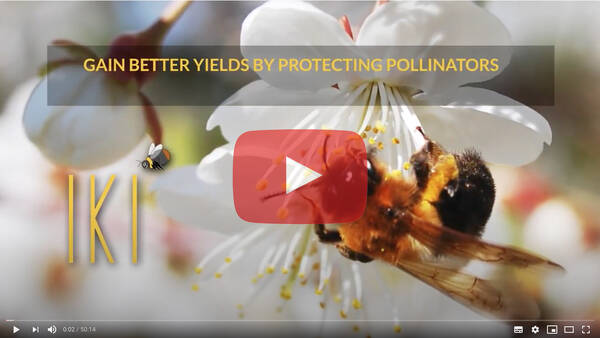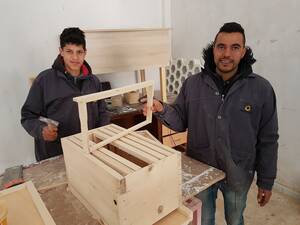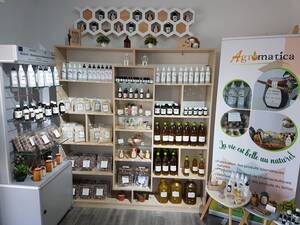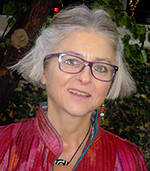Champion Pollinators

By Dr. Stefanie Christman and Udo Rudiger
Increasing food security and farmers income by Farming with Alternative Pollinators
Since 2013, ICARDA has demonstrated how the Farming with Alternative Pollinators (FAP) approach, developed by Dr. Stefanie Christmann, significantly improves farmers’ income by increasing wild pollinator abundance and diversity and attracting more natural enemies. With wild pollinators in rapid decline, ICARDA hopes that FAP, through its proven economic advantages, will motivate farmers worldwide to deploy the same approach.
The common pollinator protection approach in high-income countries is to subsidize strips of wildflowers, or in the language of farmers: weeds in crop fields. FAP uses only marketable habitat enhancement plants (oil seeds, spices, food crops, etc) and focuses on participatory work and knowledge sharing with farmers. This helps farmers appreciate the economic value of pollinators and natural enemies by comparing their net income from the use of FAP fields with that of monocultural control fields. FAP has consistently demonstrated significant increases of income per surface and this motivates farmers to enhance habitats near their crops.
After a successful FAP pilot in 2013-2014, the German Federal Ministry for the Environment, Nature Conservation, and Nuclear Safety (BMU), currently funds a FAP project in the MENA region, with global components. The “Conservation of pollinator diversity for enhanced climate change resilience” project is based in Morocco and includes five countries bordering the SE Mediterranean. Morocco has since strengthened its commitment to pollinators by joining the Coalition of the willing on pollinators, the first Arab country to do so.
“Animal pollinators are vital for global food security,” says Dr. Christmann, “ 75 percent of global food crops require them and 87% of all flowering plants need them for regeneration. Cross-pollination enhances genetic diversity and improves the chances of plants to adapt to changing climate. As 87% of all flowering plants depend on pollinators, all ecosystem services provided by these plants depend on pollinators. Their loss will result in serious poverty spirals, food insecurity, mass migration, and conflicts.”
Despite their importance, pollinators are rapidly in decline, but pollinator protection through FAP has tremendous cross-cutting benefits. Across four FAP projects, ICARDA has already demonstrated much higher income from FAP fields than from control fields resulting in high interest by farmers, extension services, governments, and scientists. FAP is economically self-sustaining, as it does not require subsidies, making it the first scalable pollinator-protection approach applicable for all countries, whether economically rich or poor.
Watch the film on how to gain better yields with FAP
Supporting honey producers with SMS and an innovative cooperative.
Meanwhile, in Tunisia, ICARDA’s innovative ICT2Scale project utilizes cellphone SMS’s as a means for small scale farmers to share knowledge and information. It is being scaled up by a cooperative of beekeepers and small-scale honey producers to protect their bees and improve production methods.
Established in 2018 with support from the Deutsche Gesellschaft für Internationale Zusammenarbeit (GIZ), the Apiservices cooperative is based in the mountainous and fertile governate of Jendouba and it now serves around 300 beekeepers in the region. Its main objectives are to increase the income of beekeepers, create jobs for youths, improve the honey value chain, and improve the visibility of local products in global markets.
For some time, Apiservices has rented and sold key equipment, materials, inputs and honey, and provide services such as beehive repair, beekeeping training, and coaching, production monitoring, problem-solving, and callout. Since August 2019 it has started taking advantage of ICARDA’s ICT2Scale project to add SMS services to its armory.
Last year during an ICARDA ICT2Scale workshop, thirteen SMS messages with technical advice on beekeeping were crafted and sent out to help with production, and to remind farmers of key actions at appropriate times in the season. Additionally, APIServices use the SMSs to notify farmers of equipment availability, weather warnings, interest from wholesale customers, and simply to send them well wishes and encouragement.
“Last season APIServices sent me an SMS weather alert about an impending storm, advising me to protect my hives against rain and wind. Thanks to that I saved my bees and my livelihood!” said Mounir Jaondi, a founding member of the cooperative.
However, the challenge is to make SMS services sustainable. 10,000 SMSs cost around 400 Tunisian Dollars (130 Euro). Presently funded by ICARDA, that support will stop at the project end. Imed Ghazouani, another founding member, plans to raise funds by offering different service packages. Subscribed beekeepers receive a package consisting of trainings, coaching, and prioritized access to renting material at a yearly rate of 30 TD (10 Euro). By adding the SMS service, APIServices can charge 32 TD a year to cover the SMS costs.
“To encourage membership, you can join APIServices now on special offer and pay a lower rate,” adds Mounir “we’re trying to create a buzz!”.
Find out more about ICARDA’s ICT2Scale project
--------------------
Dr. Stefanie Christman is ICARDA Senior Scientist on Farming with Alternative Pollinators
Udo Rudiger is ICARDA Agricultural Innovation Specialist





